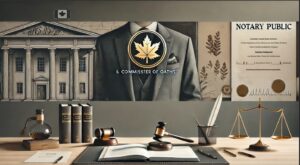Newmarket Notary Public and Commissioner of Oaths

At BF Notary Public Services, we provide comprehensive notary public and commissioner of oaths services in Newmarket, Ontario. Our offerings include certifying true copies of documents, commissioning affidavits, and notarizing statutory declarations. Whether your needs are personal, business, or legal, our expert team is here to assist you.
Our Services Include:
-
Certifying True Copies: Verification that photocopies of your original documents are accurate and authentic.
-
Commissioning Affidavits: Administering oaths and affirmations for written statements used in legal proceedings.
-
Notarizing Statutory Declarations: Official declarations required for various legal and administrative purposes.
Why Choose BF Notary Public Services?
-
Expertise: Appointed by the Attorney General of Ontario, our notary public is authorized to witness and certify signatures on legal documents.
-
Convenience: Located in Newmarket, we offer flexible appointment scheduling to accommodate your needs.
-
Affordability: Our services are competitively priced at $29.99 for standard notarization.
Frequently Asked Questions
What is a Notary Public?
A notary public is an official appointed to deter fraud by witnessing the signing of documents and verifying their authenticity. Key duties include administering oaths, taking affidavits and statutory declarations, witnessing signatures, verifying documents, certifying copies, and noting/protesting bills of exchange.
Is Remote Online Notarization Legal?
Yes, remote online notarization (RON) is legal in many jurisdictions, including Ontario, subject to specific regulations. RON utilizes digital tools and secure video conferencing to allow notaries and signers to execute documents electronically from different locations. Identity verification is conducted through digital means, and sessions are often recorded to maintain a secure record of the transaction.
Contact Us
To schedule an appointment with our Notary Public, please call us at 647-567-7407. We look forward to assisting you with your notary needs.